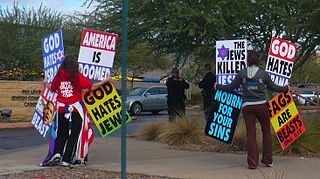Antisemitism is hostility to, prejudice towards, or discrimination against Jews. This sentiment is a form of racism, and a person who harbours it is called an antisemite. Primarily, antisemitic tendencies may be motivated by negative sentiment towards Jews as a people or by negative sentiment towards Jews with regard to Judaism. In the former case, usually presented as racial antisemitism, a person's hostility is driven by the belief that Jews constitute a distinct race with inherent traits or characteristics that are repulsive or inferior to the preferred traits or characteristics within that person's society. In the latter case, known as religious antisemitism, a person's hostility is driven by their religion's perception of Jews and Judaism, typically encompassing doctrines of supersession that expect or demand Jews to turn away from Judaism and submit to the religion presenting itself as Judaism's successor faith—this is a common theme within the other Abrahamic religions. The development of racial and religious antisemitism has historically been encouraged by the concept of anti-Judaism, which is distinct from antisemitism itself.
The Community Security Trust (CST) is a British charity whose purpose is to provide safety, security, and advice to the Jewish community in the UK. It provides advice, training, representation and research.
The Center for Countering Digital Hate (CCDH), formerly Brixton Endeavors, is a British not-for-profit NGO company with offices in London and Washington, D.C. with the stated purpose of stopping the spread of online hate speech and disinformation. It campaigns to deplatform people that it believes promote hate or misinformation, and campaigns to restrict media organisations such as The Daily Wire from advertising. CCDH is a member of the Stop Hate For Profit coalition.
Antisemitic tropes or antisemitic canards are "sensational reports, misrepresentations, or fabrications" that are defamatory towards Judaism as a religion or defamatory towards Jews as an ethnic or religious group. Since as early as the 2nd century, libels or allegations of Jewish guilt and cruelty emerged as a recurring motif along with antisemitic conspiracy theories.

Different opinions exist among historians regarding the extent of antisemitism in American history and how American antisemitism contrasted with its European counterpart. In contrast to the horrors of European history, John Higham states that in the United States "no decisive event, no deep crisis, no powerful social movement, no great individual is associated primarily with, or significant chiefly because of anti-Semitism." Accordingly, David A. Gerber concludes that antisemitism "has been a distinctly minor feature of the nation's historical development." Historian Britt Tevis argue that, "Handlin and Higham’s ideas remain influential, and many American Jewish historians continue to present antisemitism as largely insignificant, momentary, primarily social."

Antisemitism has long existed in the United States. Most Jewish community relations agencies in the United States draw distinctions between antisemitism, which is measured in terms of attitudes and behaviors, and the security and status of American Jews, which are both measured by the occurrence of specific incidents.

The Jewish Internet Defense Force (JIDF) was an organization ran social media campaigns from 2000 to 2014 against websites and Facebook groups that it described as Islamic terrorism or antisemitism. The group's website, whose former domain now links to a gambling site, described the JIDF as a "private, independent, non-violent protest organization representing a collective of activists". The JIDF was termed "hacktivism" by the BBC and Haaretz. The JIDF web site was live in February 2014 with little activity, and is no longer available.
Antisemitic incidents escalated worldwide in frequency and intensity during the Gaza War, and were widely considered to be a wave of reprisal attacks in response to the conflict.
Antisemitism in contemporary Hungary principally takes the form of negative stereotypes relating to Jews, although historically it manifested itself more violently. Studies show antisemitism has become more prevalent since the fall of Communism, particularly among the younger generations. Surveys performed from 2009 and beyond have consistently found high levels of antisemitic feelings amongst the general population.
British Jews have experienced antisemitism - discrimination and persecution as Jews - since a Jewish community was first established in England in 1070. They experienced a series of massacres in the Medieval period, which culminated in their expulsion from England in 1290.

Israeli Students combating antisemitism (ISCA) online has been founded in 2011 and operates with the purpose of fighting the growing antisemitism, xenophobia and Holocaust denial on the internet.

StopAntisemitism is an American non-profit watchdog organization focused on combating antisemitism. A proponent of new antisemitism, it additionally targets groups and individuals critical of Israel.

The Goyim Defense League (GDL) is an American neo-Nazi, antisemitic hate group and conspiracy theory network of individuals who are active on social media websites and operate an online video platform called GoyimTV. The GDL also performs banner drops, papering neighborhoods with flyers, and other stunts to harass Jews. The GDL emerged in 2018 and is led by the antisemitic provocateur Jon Minadeo II. The GDL is currently tracked by the Southern Poverty Law Center as a hate group.

Libs of TikTok is a handle for various far-right and anti-LGBT social-media accounts operated by Chaya Raichik, a former real estate agent. Raichik uses the accounts to repost content created by left-wing and LGBT people on TikTok, and on other social-media platforms, often with hostile, mocking, or derogatory commentary. The accounts promote hate speech and transphobia, and spread false claims, especially relating to medical care of transgender children. The Twitter account, also known by the handle @LibsofTikTok, has nearly 3 million followers as of February 2024 and has become influential among American conservatives and the political right. Libs of TikTok's social-media accounts have received several temporary suspensions and a permanent suspension from TikTok.
Zionist antisemitism or antisemitic Zionism refers to a phenomenon in which antisemites express support for Zionism and the State of Israel. In some cases, this support may be promoted for explicitly antisemitic reasons. Historically, this type of antisemitism has been most notable among Christian Zionists, who may perpetrate religious antisemitism while being outspoken in their support for Jewish sovereignty in Israel due to their interpretation of Christian eschatology. Similarly, people who identify with the political far-right, particularly in Europe and the United States, may support the Zionist movement because they seek to expel Jews from their country and see Zionism as the least complicated method of achieving this goal and satisfying their racial antisemitism.
Antisemitism in the People's Republic of China is a mostly 21st century phenomenon and is complicated by the fact that there is little ground for antisemitism in China in historical sources. In the 2020s, antisemitic conspiracy theories in China began to spread and intensify. Some Chinese people believe in antisemitic tropes that Jews secretly rule the world and are business-minded.
Europa: The Last Battle is a 2017 English-language Swedish ten-part neo-Nazi propaganda film directed, written and produced by Tobias Bratt, a Swedish far-right activist associated with the Nordic Resistance Movement, a European neo-Nazi movement. It promotes antisemitic conspiracy theories, including Holocaust denial, and has been promoted across multiple social media platforms.
Misinformation in the Israel–Hamas war refers to the dissemination of false, misleading or unsubstantiated information during the Israel–Hamas war. Much of the content has been viral in nature, with tens of millions of posts in circulation on social media. A variety of sources, including government officials, media outlets, and social media influencers across different countries, have contributed to the spread of these inaccuracies.
Following the Hamas-led attack on Israel on 7 October 2023 and the outbreak of the Israel–Hamas war, there has been a surge of antisemitism around the world. Israeli Immigration Minister Ofir Sofer has stated that Israel is bracing to expect a large wave of Jews migrating to Israel due to the rising antisemitism around the world.
In The Washington Post in January 2024, journalist Elizabeth Dwoskin says that the 2023 Hamas-led attack on Israel was among the most well-documented terrorist attacks in history, including evidence from smartphone and GoPro cameras of attacking Hamas militants. Dwoskin states that conspiracy theories exist stating that the attacks did not occur at all, or that they were false-flags. Some Jewish leaders and researchers have compared denial of the Hamas-led attacks to Holocaust denialism.







